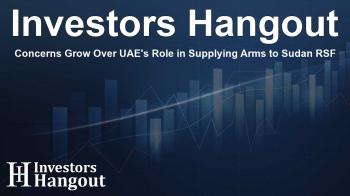Concerns Grow Over UAE's Role in Supplying Arms to Sudan RSF

U.S. Lawmakers Challenge UAE's Alleged Arms Trade
As global conflicts escalate, two U.S. lawmakers have taken a firm stance against arms sales to the United Arab Emirates (UAE), firm in their belief that the UAE is providing weapons to the paramilitary Rapid Support Forces (RSF) in the ongoing civil war in Sudan. This assertion, rooted in briefings from the previous administration and recent reports, has sparked significant debate.
Background on Sudan's Civil Conflict
The situation in Sudan has deteriorated dramatically since the 2021 coup that saw the civilian government ousted by military forces, including the RSF. The ensuing conflict, which erupted into open warfare in early 2023, has led to a humanitarian crisis, with millions facing food shortages and displacement. An alarming statistic reveals that half of Sudan's population now struggles with hunger due to the ongoing violence.
The Response from U.S. Lawmakers
Senator Chris Van Hollen and Representative Sara Jacobs, both Democrats, have expressed their concerns publicly. Van Hollen emphasized that while the UAE is a significant ally in the Middle East, the U.S. cannot ignore the potential implications of its actions in Sudan. He stated, "The UAE is an important partner, but the United States cannot turn a blind eye to its aiding and abetting the suffering in Sudan." Jacobs added that withholding arms from the UAE could potentially disrupt the supply chain to the RSF and help bring an end to the conflict.
UAE's Denial and Focus on Humanitarian Efforts
The UAE has responded to these allegations by reiterating its commitment to humanitarian aid in Sudan. A representative asserted that the country's efforts are directed towards facilitating a ceasefire and achieving a peaceful resolution. The official declared, "The UAE has made it clear that it is not providing any support to either warring faction in Sudan." This statement reflects UAE's intention to position itself as a mediator rather than a participant in the conflict.
Legislative Efforts to Block Arms Sales
In response to these escalating tensions, Van Hollen and Jacobs introduced legislation seeking to halt the sale of arms to the UAE. This legislative push followed a significant arms deal that included GMLRS and ATACMS munitions, comprising a substantial financial transaction of $1.2 billion. The lawmakers’ initiative aims to bring to light the dire humanitarian conditions stemming from the conflict in Sudan, an initiative they believe will resonate with their colleagues.
Implications of U.S. Arms Sales to the UAE
The implications of continuing arms sales to the UAE are complex. Historically, the UAE has been viewed as a crucial security partner by successive U.S. administrations. However, the potential ramifications of these sales on regional stability and humanitarian conditions will likely weigh heavily on congressional discussions. Many lawmakers are cautious, but some are adamant that drawing attention to the situation is imperative amidst one of the world's worst humanitarian crises.
Future Considerations
As the situation in Sudan continues to evolve, the role of external partners, including the UAE, remains critically scrutinized. The U.S. Congress faces challenges in balancing national security interests with moral responsibilities. The persuasive efforts by Van Hollen and Jacobs, although facing uphill battles in Congress, symbolize an important dialogue about accountability and human rights in foreign relations.
Frequently Asked Questions
What are the main allegations against the UAE?
Lawmakers allege that the UAE is supplying arms to the Rapid Support Forces (RSF) in Sudan, contributing to the ongoing civil conflict.
What is the significance of the arms sales legislation?
The legislation aims to block arms sales to the UAE, which the lawmakers believe could help mitigate the humanitarian crisis in Sudan.
How has the UAE responded to these allegations?
The UAE has denied the allegations, emphasizing its focus on humanitarian aid and calling for a ceasefire in Sudan.
What role does the U.S. Congress play in arms sales?
U.S. law requires congressional review of major arms deals, allowing Congress to force disapproval resolutions, although House members have limited power in this regard.
Why is the situation in Sudan concerning for the U.S.?
The ongoing conflict has created one of the worst humanitarian crises, with millions affected, prompting calls for U.S. intervention and reassessment of foreign arms policies.
About The Author
Contact Hannah Lewis privately here. Or send an email with ATTN: Hannah Lewis as the subject to contact@investorshangout.com.
About Investors Hangout
Investors Hangout is a leading online stock forum for financial discussion and learning, offering a wide range of free tools and resources. It draws in traders of all levels, who exchange market knowledge, investigate trading tactics, and keep an eye on industry developments in real time. Featuring financial articles, stock message boards, quotes, charts, company profiles, and live news updates. Through cooperative learning and a wealth of informational resources, it helps users from novices creating their first portfolios to experts honing their techniques. Join Investors Hangout today: https://investorshangout.com/
The content of this article is based on factual, publicly available information and does not represent legal, financial, or investment advice. Investors Hangout does not offer financial advice, and the author is not a licensed financial advisor. Consult a qualified advisor before making any financial or investment decisions based on this article. This article should not be considered advice to purchase, sell, or hold any securities or other investments. If any of the material provided here is inaccurate, please contact us for corrections.

